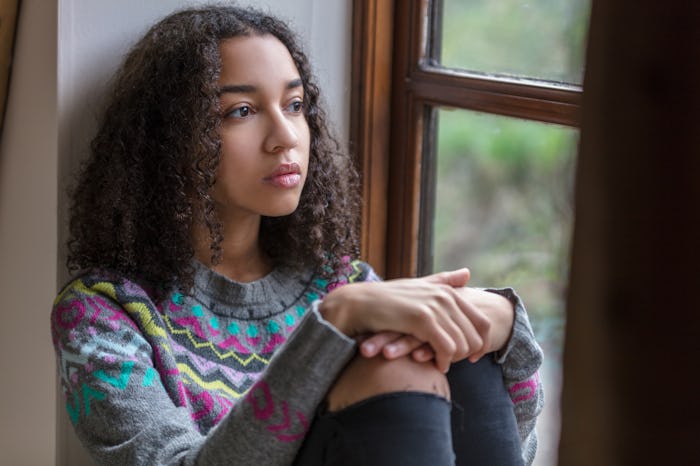Life
8 Painful Things People Don't Realize Women With PCOS Actually Deal With
As humans beings, we're quick to jump to conclusions. We see a broken car window, for example, and make assumptions about the car and its owner. We tend to be more critical of people, though, and let’s face it: our society has made us all hypercritical of women. So for women who suffer from Polycystic Ovary Syndrome (PCOS) — a condition that can often cause women to have oily skin, deeper voices, and other “less desirable” traits — navigating daily life isn't always easy. Why? Because people don’t realize all the painful things women with PCOS deal with. Instead, they just assume, judge, and remain cruel and critical.
I have been struggling, to some degree, with hair loss for the past decade. But it wasn’t until more recently that the thinning became extremely noticeable. And while I am a proud feminist, and try to be as body-positive as I can be, it’s a shot to my self-esteem. I’ve only recently been diagnosed with PCOS, and even though it gave me answers to questions regarding my decade-long hair loss, my case is fairly atypical. But I have plenty of friends with PCOS who have endured the common symptoms, and between all of us, I know it can be hard.
People don’t always have mercy or show love and acceptance when us women don’t fit into a certain beauty mold or share a particular set of experiences our society has convinced us all are "normal." Hopefully some of those folks read the following and realize that judging a book by its cover isn't just wrong, it's hurtful.
Weight Gain & The Judgment That Comes With It
Not only does PCOS make it difficult to lose weight, it usually causing those who suffer from it to actually gain weight, too. According to WebMD, PCOS can cause insulin resistance, which causes sugar (also known as glucose) to stay in the bloodstream rather than converting it into energy. That's another reason why those of us with PCOS tend to gain weight in our abdomens. But fat-shamers and body-shamers don’t care why you might be overweight or obese. Instead, they will call you lazy and be done with it, not realizing that not all bodies are the same and you can't determine a person's health based on their body size.
Plus, even if all of us were "lazy," what in the ever-loving hell do you care? How I live my life doesn't impact you or yours.
Hirsutism
When I was younger, I never really understood why some women around me had what seemed like five-o-clock shadows and others didn’t (as though it were even my business). I later learned about hirsutism, a side-effect of PCOS that causes hair to grow at a faster rate on certain areas of the body. This causes many women to grow hair on their face, back, and chest. Many women work to remove as much of this excess hair as possible, thanks to stigma and prevailing ideas of what makes a female body beautiful, but others keep and celebrate their body hair in all its glory.
Thinning Hair & Hair Loss
Thanks to jumps in testosterone, many women with PCOS start to lose their hair. These women might notice thinning, or clumps of hair falling out in the shower. The hair loss itself can become incredibly severe (I know, because I’ve been losing my own hair over the years) and, as a result, can do a number on the self-esteem. Some folks might not even realize their hair loss is a side-effect of PCOS, probably because it's not as common as hirsutism.
Acne
Just when you think the days of acne cream and annoying zits are over, you get diagnosed with PCOS and suddenly feel like a teenager in the throes of puberty. Since acne is usually related to hormones, and PCOS is many parts hormone imbalance, it’s not surprising that many of the afflicted end up breaking out. Just another “perk.”
An Irregular, Painful Period
PCOS usually means extremely painful periods. Dysmenorrhea is the name for the cramps you get during your period, but with PCOS, these cramps can cause you to double over and miss work and other life activities as a result of in the incredible discomfort. PCOS can also make your cycle irregular, causing you to miss periods or have very light periods. Yay.
Infertility Issues
According to Resolve.org, the ovaries of women with PCOS often do not go on to ovulate, making it difficult and/or impossible for these women to get pregnant if and/or when they want to. Additionally, the hormone imbalances may prompt miscarriages and preterm labor for those who do become pregnant.
Suffice to say, getting pregnant is not that simple for a majority of people with PCOS. While it’s never been fully determined, there’s a chance that my own preterm labor (which resulted in losing my first child) was also related, at least in part, to this hormonal issues.
Mood Fluctuations
Hormones suck, and they do a number on your emotional state. Not only can you experience strong and frequent mood swings when you have pACOS, but according to the PCOS Awareness Association you might also deal with mood disorders, like anxiety and depression. And no, we can’t just “get over it” or read a bunch of inspirational quotes to feel better.
Fatigue
Some PCOS sufferers experience trouble sleeping, while others may feel tired due to insulin resistance, as previously mentioned, when they eat foods that just aren’t meshing well with their bodies. Depression (which can be caused by PCOS) can also leave one feeling especially exhausted.
Overall, those with PCOS need to go a few extra steps to feel as "awake" as those without it.
Check out Romper's new video series, Romper's Doula Diaries:
